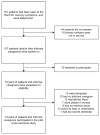The Cultural Diversity of Dementia Patients and Caregivers in Primary Care Case Management: a Pilot Mixed Methods Study
- PMID: 34484501
- PMCID: PMC8390323
- DOI: 10.5770/cgj.24.490
The Cultural Diversity of Dementia Patients and Caregivers in Primary Care Case Management: a Pilot Mixed Methods Study
Abstract
Context: The Canadian reality of dementia care may be complicated by the cultural diversity of patients and their informal caregivers.
Objectives: To what extent do needs differ between Canadian- and foreign-born patients and caregivers? What are their experiences with the illness in primary care case management?
Methods: Mixed methods, sequential explanatory design (a cross-sectional study, followed by a qualitative descriptive study), involving 15 pairs of patients and caregivers.
Results: Foreign-born patients had more needs compared to their Canadian-born counterparts. Foreign-born caregivers reported more stress, more problems, and increased need for services. However, the reported experiences of Canadian- vs. foreign-born individuals were similar.
Conclusion: The results remain hypothesis-generating. The present pilot illustrated the suitability of mixed methods to this area of study, which deserves further investigation to better serve all members of a population already vulnerable by age and disease.
Keywords: culture; dementia; ethnicity; mixed methods study.
© 2021 Author(s). Published by the Canadian Geriatrics Society.
Conflict of interest statement
CONFLICT OF INTEREST DISCLOSURES The authors declare that no conflicts of interest exist.
Figures
References
-
- Alzheimer Society of Canada Population Health Expert Panel. Prevalence and monetary costs of dementia in Canada. Toronto, ON: Alzheimer Society of Canada; 2016. Available from: https://alzheimer.ca/sites/default/files/files/national/statistics/preva....
-
- Government of Canada. Public Health Agency of Canada. Neurological Health Charities Canada, The Public Health Agency of Canada, Health Canada and The Canadian Institutes of Health Research. Ottawa, ON: Public Health Agency; 2014. Mapping connections: an understanding of neurological conditions in Canada: the National Population Health Study of Neurological Conditions. Available from: https://www.canada.ca/en/public-health/services/reports-publications/map....
-
- World Health Organization. Dementia [fact-sheet] Geneva: WHO; 2017. [cited 2019]. Available from: https://www.who.int/en/news-room/fact-sheets/detail/dementia.
-
- Bergman H. Report of the Committee of Experts for the Development of an Action Plan on Alzheimer’s Disease and Related Disorders. Montreal, QC: Ministère de la Santé et des Services Sociaux (MSSS); 2009. Meeting the challenge of Alzheimer’s disease and related disorders: a vision focused on the individual, humanism, and excellence.
LinkOut - more resources
Full Text Sources

